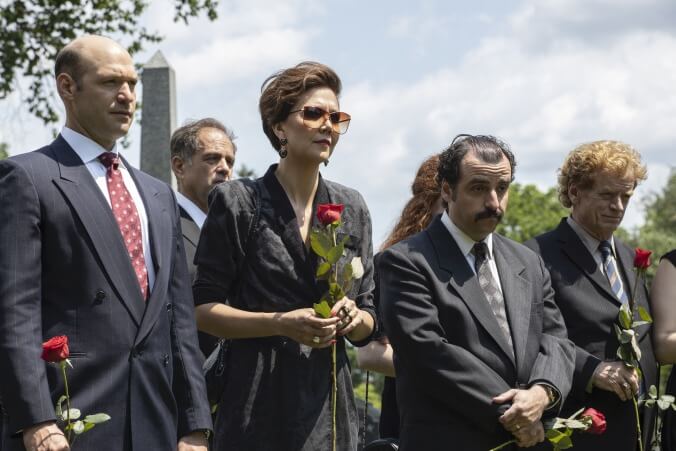Awards like Emmys and Golden Globes are mostly meaningless, and ultimately have little to nothing to do with how a TV series is regarded or remembered. Nevertheless, it’s a damn shame that Maggie Gyllenhaal will likely end her run on The Deuce with little to no industry recognition for the work she’s been doing here. Thus far, she’s received one Globe nomination for The Deuce—for season one—and that’s it. One. And for this week’s episode alone, she shouldn’t just win a trophy, she should have one named after her.
I wouldn’t go so far as to say that Gyllenhaal in the latest episode justifies the entire existence of The Deuce, since there’s always been plenty else to recommend about this show. But the monologue she delivers as Eileen this week—about how the character’s perpetually disappointed, conservative Catholic dad took her to get an illegal abortion when she was a teenager, and how she tried to convince herself that this meant he actually cared about her—is a miraculous bit of acting, building slowly from quietly observational storytelling to a painful eruption of emotion. When Eileen remembers her father disappearing during the procedure, and how she realized, “He needs the lie more than he could ever need you,” the ache in her voice transforms the energy of the scene.
And that’s just one of multiple Gyllenhaal highlights in this episode, which Is titled “This Trust Thing.” Eileen tells the story about her abortion to an actress she’s hired for a movie she’s making about what it’s really like to be a woman in America in 1985. She started out wanting to make a film about sex workers; but while interviewing a potential cinematographer at a diner, she finds herself captivated by a waitress who lets her male clientele behave like absolute pigs, because she has to hustle for tips. Eileen decides that focusing on prostitutes and pornographers would let her audience off the hook, because it would just give then “something to gawk at.” Instead she wants everyone to understand something that unites women: “What we trade, what we give away… Every woman in this world is sellin’.”
In another powerhouse monologue, Eileen persuades Harvey to cover half her budget, to make up for the myriad ways his work has made women’s lives worse. “This is your world,” she says. “You guys made this motherfucker. … What men want—no, what they’ll pay for—that becomes the world.”
Just ask Lori. Once she got free of C.C. last season, she conceded control of her life and career to her agent Kiki (whose name even rhymes with C.C.), and to her producer boyfriend Greg. But neither of them have been able to live up to their promises. She’s given most of her earnings to Greg for him to launch his production company, with her, in theory, as his profit-participating star. But he claims he can’t make a go of it because the porn market’s already oversaturated. Kiki. meanwhile, only seems interested in selling her client on the cheap, rather than fighting for Lori’s true earning potential.
When Lori shows up at a shoot and sees a dozen dudes and no other ladies, she knows it’s time to fire her manager. She decides to dump her boyfriend, too, after finding him having sex with another woman in their bedroom, while Bryan Adams’ “Summer of ’69” plays. These are not the best days of her life.
Melissa knows what Eileen’s talking about, too. As was made clear by the opening scenes of “They Can Never Go Home,” two episodes ago, Melissa’s father was never going to be able to welcome her back with open arms and a forgiving heart. “He needs the answers,” she sighs to her friend Reg, while speculating that even though her dad gave up booze, he still has all the guilt and anger issues of a raging alcoholic. “Dry drunks,” Reg nods, calling out this particular type of guy. These too are the men who make the world.
About half of “This Trust Thing” is about the machinations of these men, some of whom have struggles of their own. Gene Goldman and Detective Chris Alston are doing okay, continuing to work together to transfer control of Times Square away from the smut-peddlers to the real estate tycoons. They run into a snag this week, when one of the landlords they’re trying to oust turns out to be a consortium that has donated big money to Ed Koch. As a solution, Goldman somewhat questionably uses Alston as his “bad cop,” painting him as the untouchable black lieutenant who might stir up trouble in the newspapers if he doesn’t get his way. And so the recalcitrant slumlords finally back off—and get paid. It’s no wonder that Chris later gets an earful of beef from his old colleague on vice, who complains cleaning up the Deuce means that no dishonest cop can make a dollar.
As always, Gene makes these moves knowing that eventually he may end up putting his favorite gay hookup spots out of business. Paul, for one, is already planning to liquidate his stake in all of his bars and bathhouses, and—after a conversation with a friend who may be Larry Kramer?—to donate the proceeds to the Gay Men’s Health Crisis. Paul hates the kind of pay-to-play politics that “closeted pricks” like Koch and Goldman represent. (“Why should I have to pay for people to do jobs they already get paid for?”) But as his unnamed friend—who, again, is probably Larry Kramer—says, if gay men are doomed to extinction in New York City, they may as well “die screaming.”
Speaking of a culture dying off, let’s say a fond farewell to Rudy Pipilo, who makes one last futile effort to preserve order in the Deuce, after Vincent kills the man who killed Frankie. Everything about Rudy is old school—including the mellow ‘50s pop playing at his favorite mafia bar—and so he presumes he’ll be respected when he tries to straighten out Tommy Longo for brokering coke deals and for allowing two “earners” like the Martino brothers to get targeted. Even Rudy’s fate is classic: Tommy shoots him dead, in a car parked down a dark Manhattan street.
On second thought though, maybe we shouldn’t feel too much sympathy for Rudy, who spent most of his life profiting off the work of women who were either discarded or scarred after their time on the streets, in the parlors, in the peep show booths, and on porn sets. When Bobby this week gets annoyed that he can’t fill Rudy’s envelope because the parlor prostitutes are looking for better opportunities, Bobby grumbles in his good ol’ boy “things were better in my day” way about how when he worked a union job, he had a better work ethic than these hookers. When Black Frankie replies that Bobby’s ladies also, “Kind of unionized, didn’t they?,” the boss doesn’t know how to respond. Would these men who made the world have been so adamant about their codes and ethics and rules, if they’d known they could apply to women too?
Stray observations
- Two nice touches in the opening diner scene: The waitress who’s getting sexually harassed left and right has an accent and cadence that sounds just like Eileen’s; and during the establishing shot, a burned-out “N” in the outdoor sign makes it look like the restaurant in question is a “DIER.” (I hope that’s not foreshadowing for Eileen’s story.)


